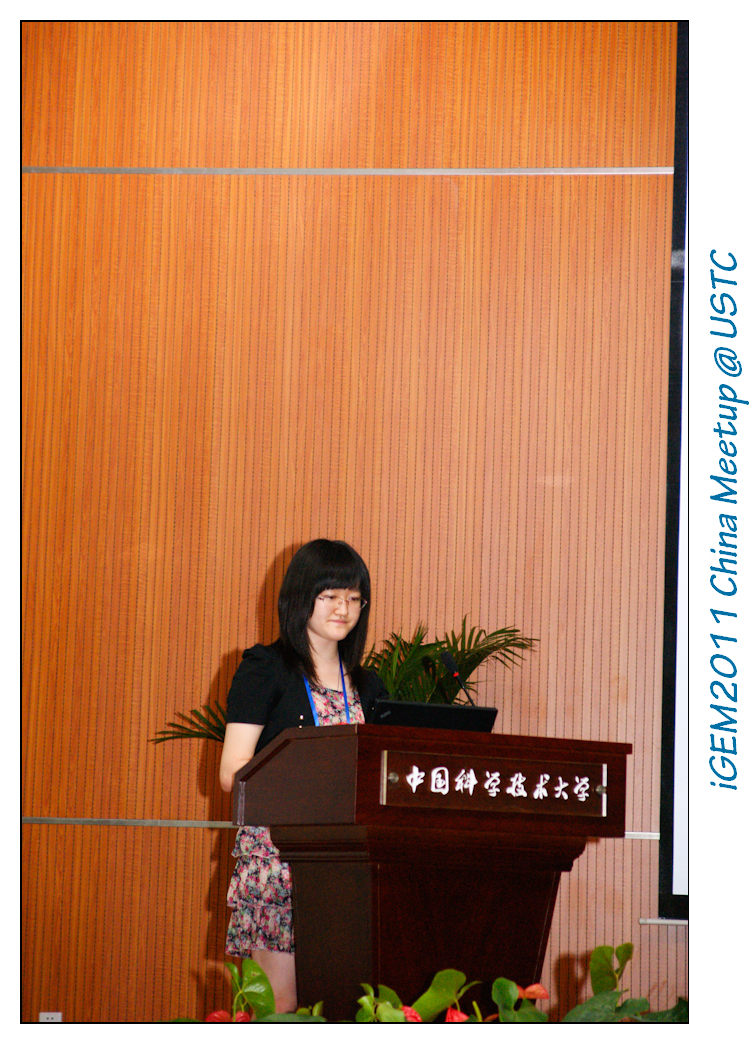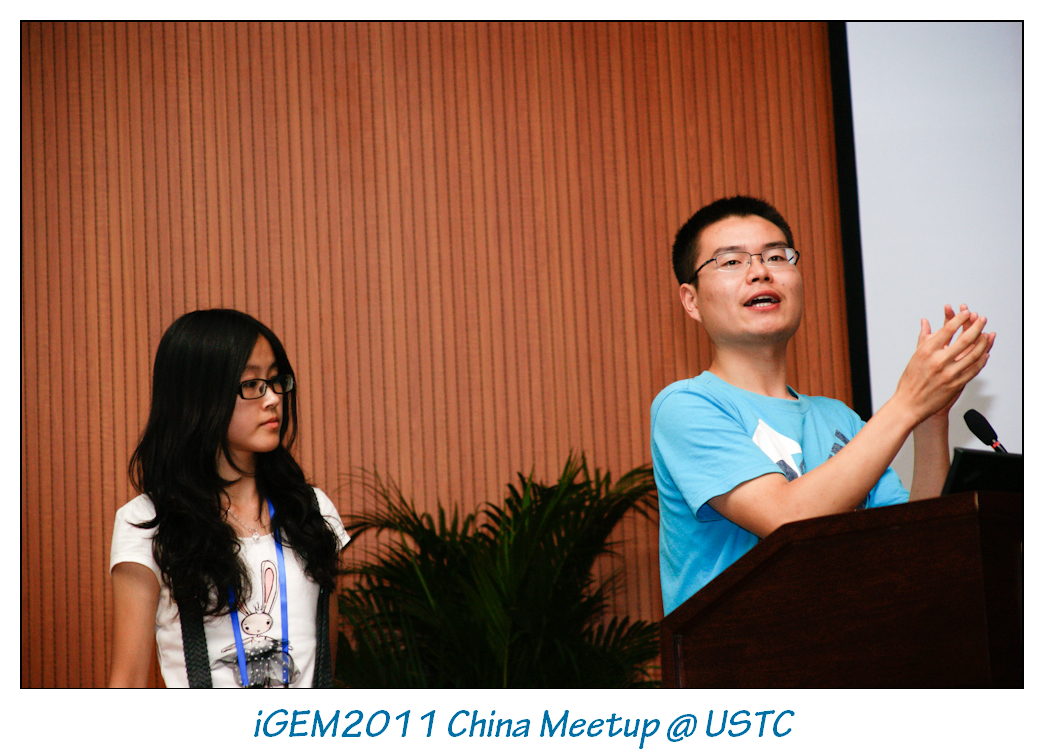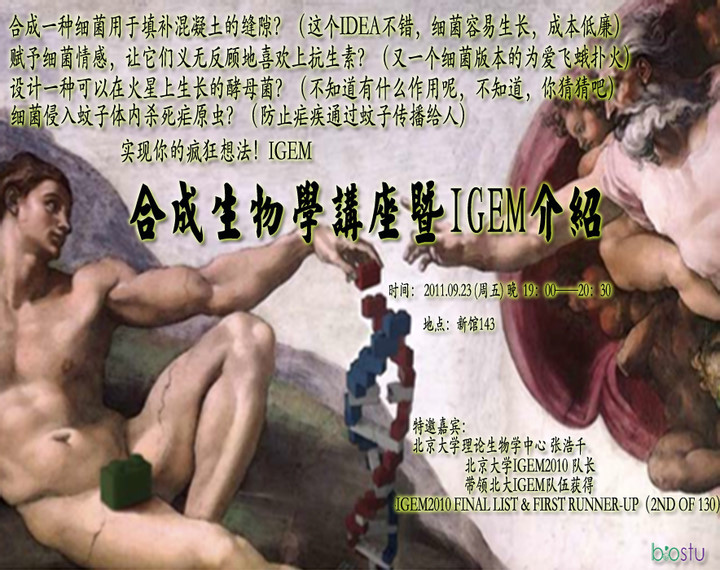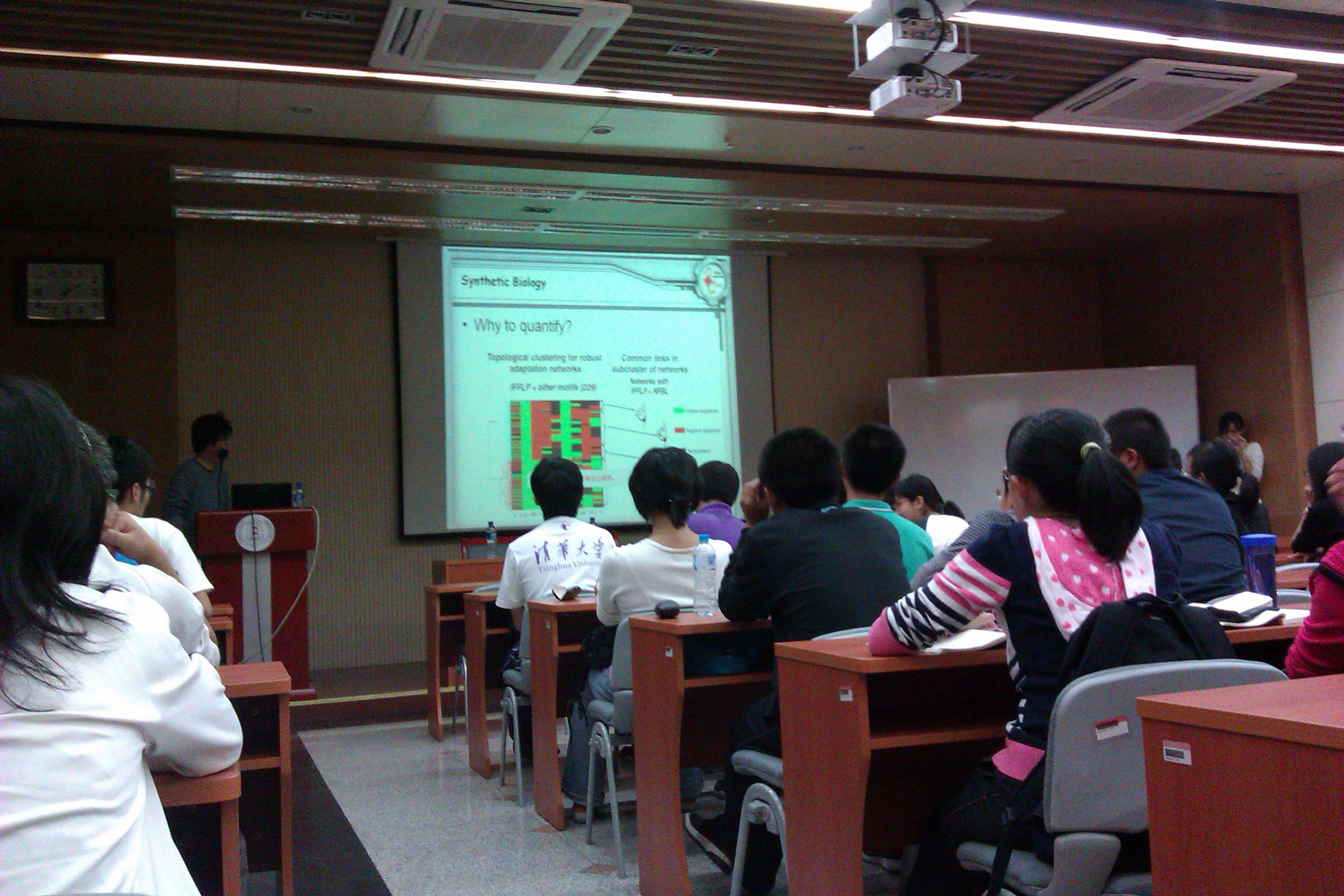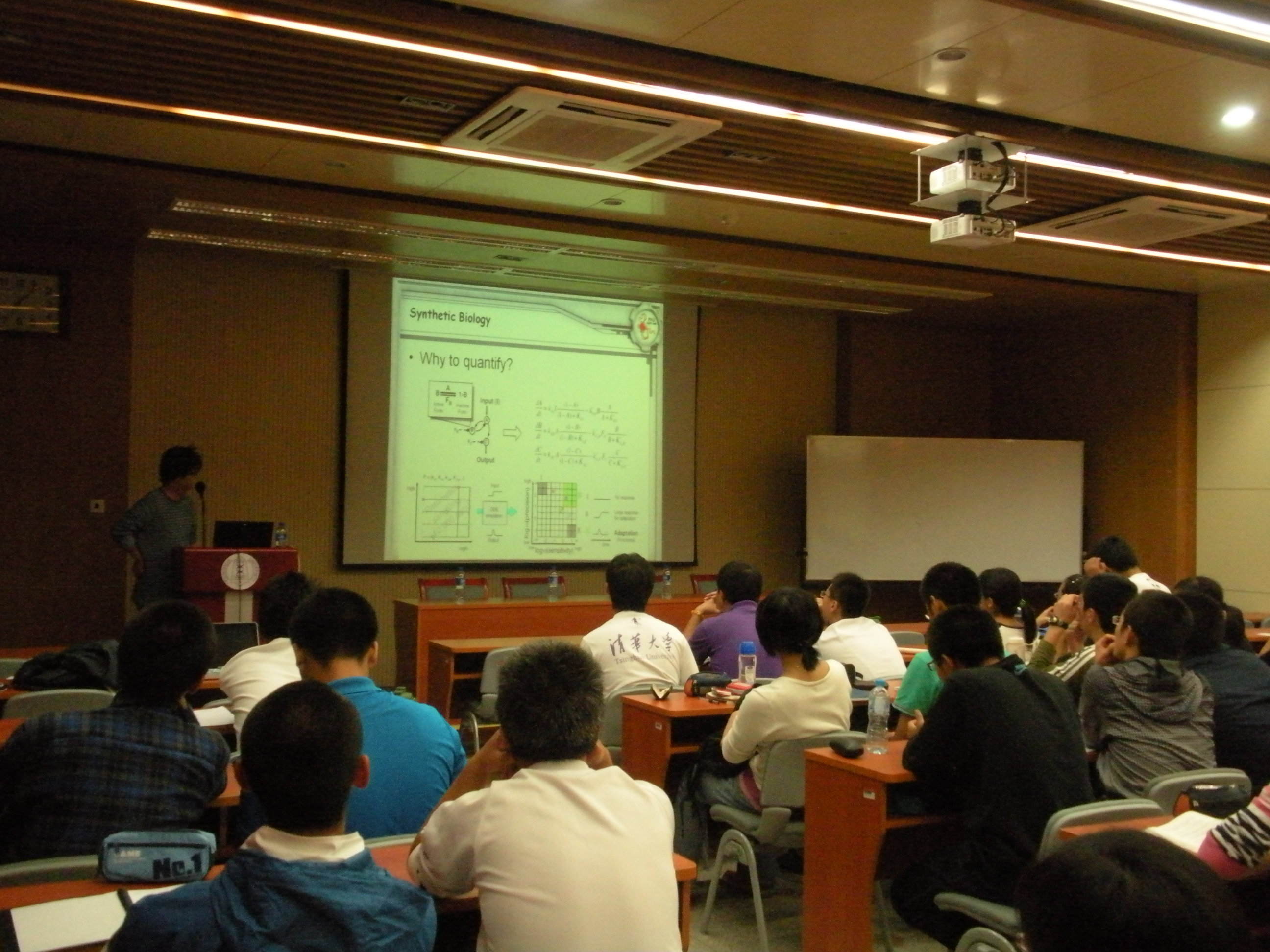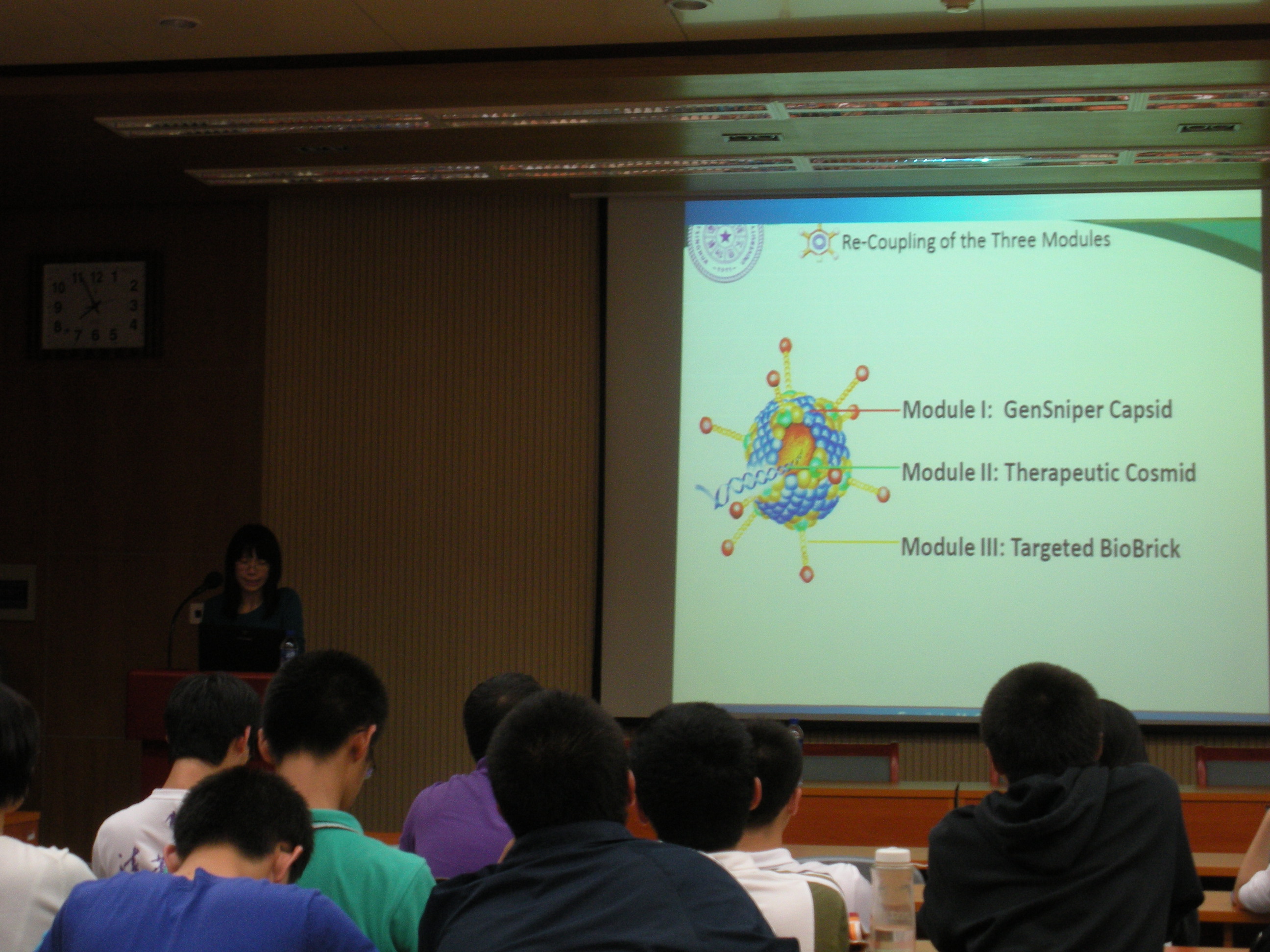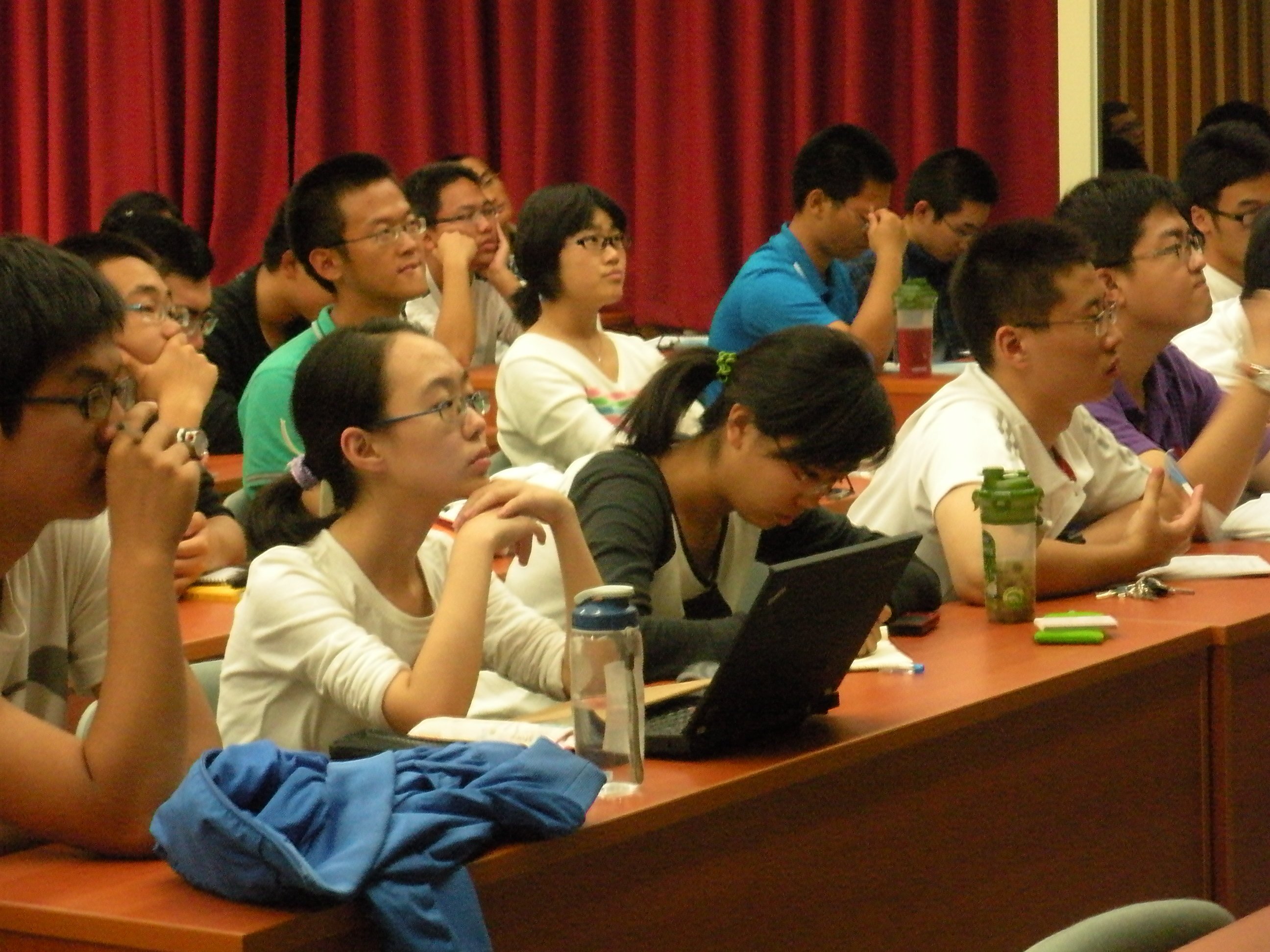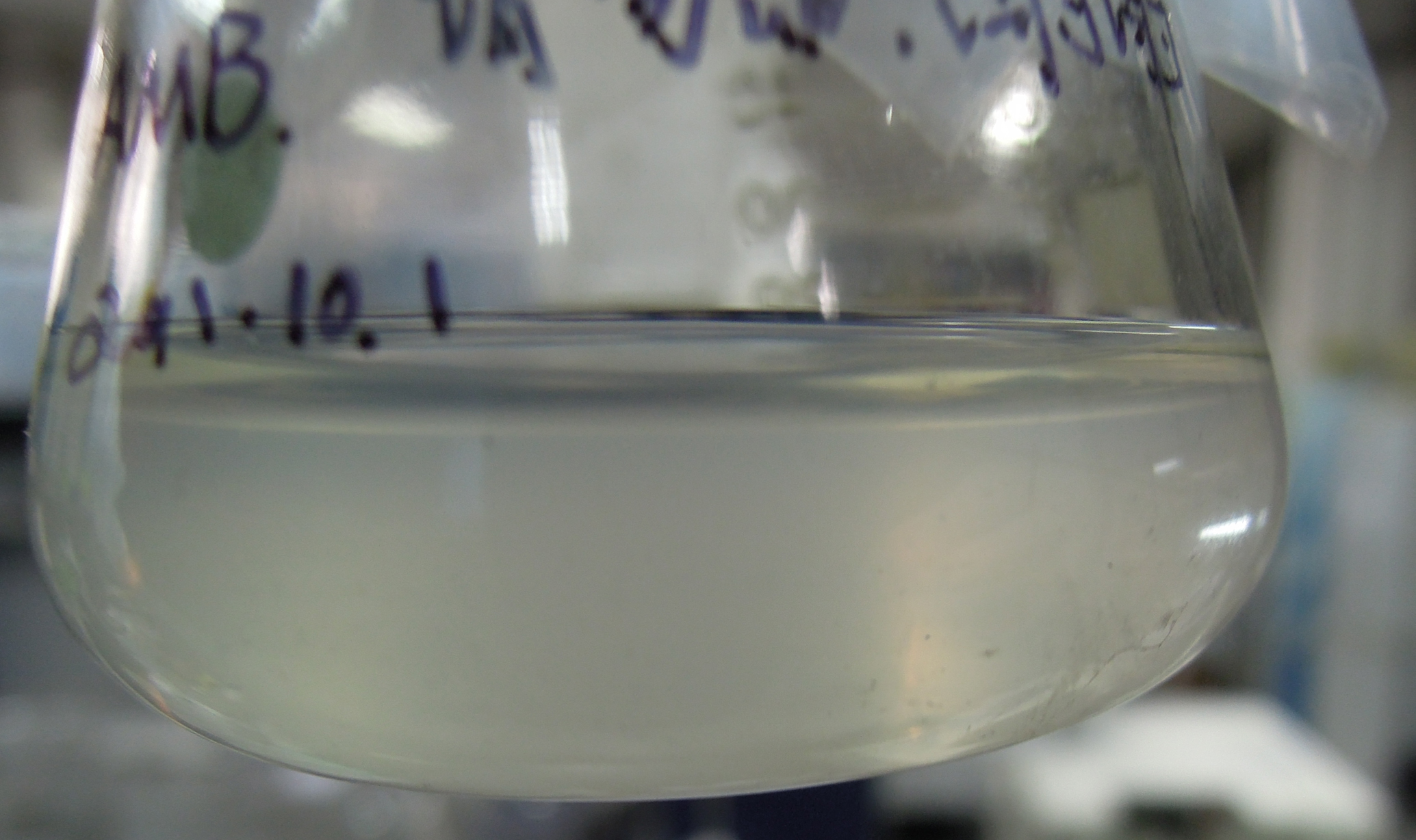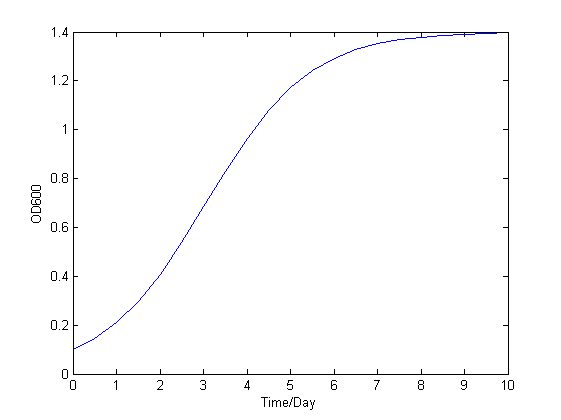Team:Tsinghua/HumanPractice
From 2011.igem.org
(→Cooperation with NYMU) |
|||
| (53 intermediate revisions not shown) | |||
| Line 7: | Line 7: | ||
<div id="content_box"> | <div id="content_box"> | ||
<script> | <script> | ||
| - | navl = new Array(" | + | navl = new Array("China Meetup", "Publicity", "Cooperation with NYMU", "Cooperation with XMU", "Cooperation with Tsinghua-A", "Contributions"); |
| - | lk = new Array("# | + | lk = new Array("#cn", "#pub", "#nymu", "#xmu", "#tsa", "#attr"); |
writenav(navl, lk); | writenav(navl, lk); | ||
</script> | </script> | ||
<div id="main_content"> | <div id="main_content"> | ||
| + | <a id="cn"></a> | ||
</html> | </html> | ||
| - | + | ='''''Overview'''''= | |
| - | + | Synthetic biology is a brand new field of biological research which combines science and engineering. Since a large majority of people are quite not familiar with this promising and appealing field, we hope to promote greater public awareness of synthetic biology as well as the iGEM competition with our motivation and inspiration. To achieve this goal, we held a Synthetic Biology Workshop during this summer and autumn, including several activities listed below. In addition, we cooperated with several teams to promote the mutual rapid progress and development of synthetic biology. | |
| - | + | <html><a id="pub"></a></html> | |
| + | <html><a id="pub"></a></html> | ||
| + | =''iGEM 2011 China Meetup'' = | ||
| - | The | + | The China Meetup this year is held in USTC(University of Science and Technology of China) on 29th to 31st July. Tsinghua team took an extraordinarily active part in the meeting. |
| + | Our team member, Guanqiao Li, attended the meetup as invited speaker and gave a splendid and impressive talk on Wisdom in Natural Systems(figure shown on the left). She described about several brilliant mechanisms of natural systems and highlighted the manipulations should be performed based on our deeper and more thorough understanding of natural systems. The wonderful speech drew forth enthusiastic applause and further heated discussion. | ||
| - | + | In addition, Tsinghua team also held a report on the progress of our project this year (figure shown on the right). As the first presenters of all the teams, we were under great stress. However, the result turned out to be great and we got highly recommend eventually, which is to our comfort. Quite a lot of students were quite curious about our project and asked detailed questions after the talk. | |
| + | What’s more, we listened attentively to the talks given by senior professors and shared our opinions with other participants. In that meeting, we really learnt about the scientific frontier of synthetic biology and developed critical thinking of those projects. | ||
| - | |||
| - | [[File: | + | [[File:NEO_IMG_Edited_DSC1995-2.jpg|300px]] |
| + | [[File:meetup2.jpg|300px]] | ||
| - | + | <html><a id="pub"></a></html> | |
| + | =''Lecture on Synthetic Biology'' = | ||
| + | |||
| + | To popularize the concept and spirit of synthetic biology, Tsinghua team held a lecture on September 23rd, which was mainly oriented to the lower grade students in School of Life Sciences, as well as all the other students who were interested in synthetic biology. | ||
| + | |||
| + | The preparation of the lecture started 3 weeks prior to the lecture. Posters (See below) were elaborately designed and posted up around the campus. We also bulletined the news through E-mail and SNS, to ensure every potential audience might be interested in it. | ||
| + | |||
| + | Haoqian ZHANG from Center for Theoretical Biology, Peking University was invited as our important guest and major speaker. Haoqian, who is very familiar with synthetic and system biology, has participated iGEM competition for three times, and led Peking team up to Runner-up in Final list last year. Furthermore, as the advisor this year, he has huge ambition to perform their project much better and more elegant. | ||
| + | |||
| + | On the evening of Friday, Sept.23rd, we were flattered the moment walking into meeting place, for the room was almost filled up. Never had we thought that the lecture would attract such many audiences. The audiences, most of which were sophomore and freshmen, responded warmly to the splendid lectures given by the three speakers. Haoqian ZHANG first gave an overall introduction of the history of synthetic biology. And then he went on with several detailed programs and potential applications on theory of synthetic biology, such as logical circuits and dual switches. The audiences were shocked by the marvelous and multiple work done by the engineered bacteria in a popular and easy-to-understand language. The talks took ninety minutes in all, while the question and answer session lasted for another half an hour. His wonderful speech in his unique humorous style won him warm applause from the audiences in the end. | ||
| + | |||
| + | [[File:Lecture.jpg|300px]] [[File:IMAG0081.jpg|300px]] | ||
| + | |||
| + | [[File:照片_005.jpg|300px]] | ||
| + | |||
| + | |||
| + | <html> | ||
| + | <a id="nymu"></a> | ||
| + | </html> | ||
| + | |||
| + | =''Tsinghua iGEM Seminar & Lab Tour'' = | ||
| + | In order to appeal young minds in high school to life science and students from all departments in Tsinghua university to know more about IGEM, we held a Tsinghua IGEM seminar followed by a lab tour on 8th October. | ||
| + | |||
| + | In the beginning, two members of our team, Guanqiao LI and Chen CHEN, held a presentation to introduce IGEM and presented our previous projects, like “E.Immunology”, “Gene Sniper” and the project “E.colimousine” this year. We would like to lay emphasis on the enormous and impressive functions and applications of life science, especially of synthetic biology. After introducing our project, students showed great interests in our projects and raised many questions about them. | ||
| + | |||
| + | To develop a perceptual knowledge of the interesting task, students were invited to look around our labs in school of Life Science. Almost everyone was grateful for this opportunity to get close to synthetic biology. The whole activity ended successfully and our effort really pays off! | ||
| + | |||
| + | [[File:照片_024.jpg|300px]] [[File:DSCN7278.JPG|300px]] | ||
| + | |||
| + | |||
| + | <html><a id="nymu"></a></html> | ||
| + | |||
| + | =''Cooperation with NYMU''= | ||
| + | |||
| + | This year, [[Team:NYMU-Taipei]] sent us email for help with verification of shuttle vector for AMB-1 magnetic bacteria. | ||
| + | |||
| + | [[File:Thuhp_amb.png|500px]] | ||
| + | |||
| + | We cultured the AMB-1 bacteria according to the instructions offered by NYMU and measured its OD value accordingly. | ||
| + | We prepared electrocompetent cells with TES-sucrose buffer and transformed them with pYMBG vector. We thus verified pYMBG as the functional shuttle vector and characterized their part [http://partsregistry.org/Part:BBa_K624021 BBa_K624021]. | ||
| + | |||
| + | [[File:ThuCurve.png|400px]] | ||
| + | |||
| + | ''Fitted growth curve of AMB-1 in aerobic conditions'' | ||
| + | |||
| + | <html> | ||
| + | |||
| + | |||
| + | <a id="xmu"></a></html> | ||
| + | |||
| + | =''Cooperation with XMU''= | ||
| + | |||
| + | XMU Team met difficulties while building their parts. They could not successfully transform E. coli with parts delivered. | ||
| + | |||
| + | We transformed bacteria with pSB1C3 plasmid and mailed them the bacteria culture. | ||
| + | |||
| + | |||
| + | |||
| + | <html> | ||
| + | |||
| + | <a id="tsa"></a></html> | ||
| + | |||
| + | =''Cooperation with Tsinghua-A''= | ||
| + | |||
| + | We met difficulties solving and visualizing our mathematical model. Tsinghua-A helped us solved and visualized the model concerning gradient formation in liquid and part of the model on movement. | ||
| + | |||
| + | |||
| + | <html><a id="attr"></a></html> | ||
| + | |||
| + | =''Contributions and Attributions''= | ||
| + | |||
| + | Xiao SHI took charge of finance for the whole competition. Yu ZHAO and Li LI contributed greatly to the chemotaxis part. Pan DENG ,Liyuan ZHU , Li LI , Yunxiao ZHANG , Linlin CAO , Guanqiao LI and Shiqi WANG shared the honor of constructing the plasmids for all the latter experiments. Chen CHEN , Yu ZHAO and Li LI finished the protein purification, interaction and detection parts. Linlin CAO helped correct the typo errors in this wiki as you read. | ||
| + | |||
| + | [[File:Smile.jpg|300px]] | ||
| + | |||
| + | We also need to extend our gratitude towards the assistance from other laboratories. Dr. Mark Goulian from Department of Biology, U Penn, supported us with the E. coli strain and the necessary plasmids for chemotaxis. Dr. Christopher Voigt from Department of Pharmaceutical Chemistry, UCSF provided us another chemotaxis strain and the chemotaxis toggle vector. | ||
<html> | <html> | ||
| - | |||
</div></div> | </div></div> | ||
Latest revision as of 19:02, 28 October 2011

Overview
Synthetic biology is a brand new field of biological research which combines science and engineering. Since a large majority of people are quite not familiar with this promising and appealing field, we hope to promote greater public awareness of synthetic biology as well as the iGEM competition with our motivation and inspiration. To achieve this goal, we held a Synthetic Biology Workshop during this summer and autumn, including several activities listed below. In addition, we cooperated with several teams to promote the mutual rapid progress and development of synthetic biology.
iGEM 2011 China Meetup
The China Meetup this year is held in USTC(University of Science and Technology of China) on 29th to 31st July. Tsinghua team took an extraordinarily active part in the meeting.
Our team member, Guanqiao Li, attended the meetup as invited speaker and gave a splendid and impressive talk on Wisdom in Natural Systems(figure shown on the left). She described about several brilliant mechanisms of natural systems and highlighted the manipulations should be performed based on our deeper and more thorough understanding of natural systems. The wonderful speech drew forth enthusiastic applause and further heated discussion.
In addition, Tsinghua team also held a report on the progress of our project this year (figure shown on the right). As the first presenters of all the teams, we were under great stress. However, the result turned out to be great and we got highly recommend eventually, which is to our comfort. Quite a lot of students were quite curious about our project and asked detailed questions after the talk.
What’s more, we listened attentively to the talks given by senior professors and shared our opinions with other participants. In that meeting, we really learnt about the scientific frontier of synthetic biology and developed critical thinking of those projects.
Lecture on Synthetic Biology
To popularize the concept and spirit of synthetic biology, Tsinghua team held a lecture on September 23rd, which was mainly oriented to the lower grade students in School of Life Sciences, as well as all the other students who were interested in synthetic biology.
The preparation of the lecture started 3 weeks prior to the lecture. Posters (See below) were elaborately designed and posted up around the campus. We also bulletined the news through E-mail and SNS, to ensure every potential audience might be interested in it.
Haoqian ZHANG from Center for Theoretical Biology, Peking University was invited as our important guest and major speaker. Haoqian, who is very familiar with synthetic and system biology, has participated iGEM competition for three times, and led Peking team up to Runner-up in Final list last year. Furthermore, as the advisor this year, he has huge ambition to perform their project much better and more elegant.
On the evening of Friday, Sept.23rd, we were flattered the moment walking into meeting place, for the room was almost filled up. Never had we thought that the lecture would attract such many audiences. The audiences, most of which were sophomore and freshmen, responded warmly to the splendid lectures given by the three speakers. Haoqian ZHANG first gave an overall introduction of the history of synthetic biology. And then he went on with several detailed programs and potential applications on theory of synthetic biology, such as logical circuits and dual switches. The audiences were shocked by the marvelous and multiple work done by the engineered bacteria in a popular and easy-to-understand language. The talks took ninety minutes in all, while the question and answer session lasted for another half an hour. His wonderful speech in his unique humorous style won him warm applause from the audiences in the end.
Tsinghua iGEM Seminar & Lab Tour
In order to appeal young minds in high school to life science and students from all departments in Tsinghua university to know more about IGEM, we held a Tsinghua IGEM seminar followed by a lab tour on 8th October.
In the beginning, two members of our team, Guanqiao LI and Chen CHEN, held a presentation to introduce IGEM and presented our previous projects, like “E.Immunology”, “Gene Sniper” and the project “E.colimousine” this year. We would like to lay emphasis on the enormous and impressive functions and applications of life science, especially of synthetic biology. After introducing our project, students showed great interests in our projects and raised many questions about them.
To develop a perceptual knowledge of the interesting task, students were invited to look around our labs in school of Life Science. Almost everyone was grateful for this opportunity to get close to synthetic biology. The whole activity ended successfully and our effort really pays off!
Cooperation with NYMU
This year, Team:NYMU-Taipei sent us email for help with verification of shuttle vector for AMB-1 magnetic bacteria.
We cultured the AMB-1 bacteria according to the instructions offered by NYMU and measured its OD value accordingly. We prepared electrocompetent cells with TES-sucrose buffer and transformed them with pYMBG vector. We thus verified pYMBG as the functional shuttle vector and characterized their part [http://partsregistry.org/Part:BBa_K624021 BBa_K624021].
Fitted growth curve of AMB-1 in aerobic conditions
Cooperation with XMU
XMU Team met difficulties while building their parts. They could not successfully transform E. coli with parts delivered.
We transformed bacteria with pSB1C3 plasmid and mailed them the bacteria culture.
Cooperation with Tsinghua-A
We met difficulties solving and visualizing our mathematical model. Tsinghua-A helped us solved and visualized the model concerning gradient formation in liquid and part of the model on movement.
Contributions and Attributions
Xiao SHI took charge of finance for the whole competition. Yu ZHAO and Li LI contributed greatly to the chemotaxis part. Pan DENG ,Liyuan ZHU , Li LI , Yunxiao ZHANG , Linlin CAO , Guanqiao LI and Shiqi WANG shared the honor of constructing the plasmids for all the latter experiments. Chen CHEN , Yu ZHAO and Li LI finished the protein purification, interaction and detection parts. Linlin CAO helped correct the typo errors in this wiki as you read.
We also need to extend our gratitude towards the assistance from other laboratories. Dr. Mark Goulian from Department of Biology, U Penn, supported us with the E. coli strain and the necessary plasmids for chemotaxis. Dr. Christopher Voigt from Department of Pharmaceutical Chemistry, UCSF provided us another chemotaxis strain and the chemotaxis toggle vector.
 "
"






